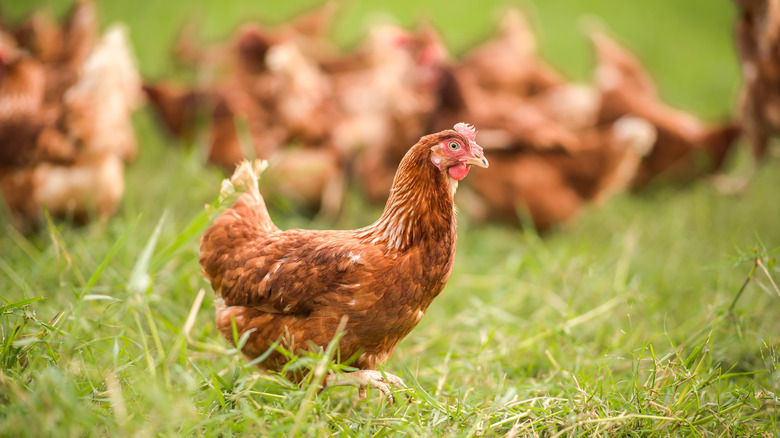How To Decode Your Egg Label
Maybe you have a favorite brand of eggs that you grew up with, or maybe you reach for the carton that you believe is the most ethical choice on the shelf. But what you likely don't realize is that there is far more to understand behind the label on your eggs than what you might realize. From the conditions under which the hens are raised to what they are fed or have the opportunity to eat, the labels have quite different meanings — and some of them are not government-regulated.
Fortunately, there are some regulations for a couple of the most widely available carton options you'll find at the grocery store. According to HuffPost, cage-free and free-range are the two types of eggs produced under conditions regulated by the U.S. Department of Agriculture. Cage-free means the hens are not confined to a cage, although they do not necessarily have access to the outdoors. It doesn't mean they have excessive room to move around.
Free-range is similar to cage-free, except it means the hens had access to the outdoors, or at the very least, a screened-in porch. As for pasture-raised — this label does not carry much significance because the USDA does not regulate it. Unfortunately, that means there's no way to know the very minimal state of the hens' living arrangement.
Look for this certification instead
As HuffPost points out, certified humane is the only indication of a better lifestyle when choosing from pasture-raised eggs. Like cage-free or free-range, certified humane requires specific standards to ensure the hens have an acceptable quality of life (via Goop). Hens raised using certified humane methods must be given 108 square feet of space each. They are raised outdoors with available shelter in flocks of no more than 500 birds, and farmers must rotate them between fields to ensure the quality and longevity of the land.
If you are looking for eggs that reflect a good quality of life for hens and have no questionable feeding materials, you should look for organic eggs. According to Goop, this ensures the hens are not raised around synthetic fertilizers or sewage. Hens on a vegetarian diet are only kept from animal byproducts, although they can still eat insects outdoors.
Decide what's most important to you when shopping for eggs and familiarize yourself with the terms. If you're concerned about what the hens, and therefore the eggs, were fed during their production, you might want to buy organic and vegetarian-fed eggs. Those looking for the most ethically raised hens should try to purchase certified humane eggs. So next time you're in the grocery store, take another glance at the cartons and their labels the next time you buy eggs.

